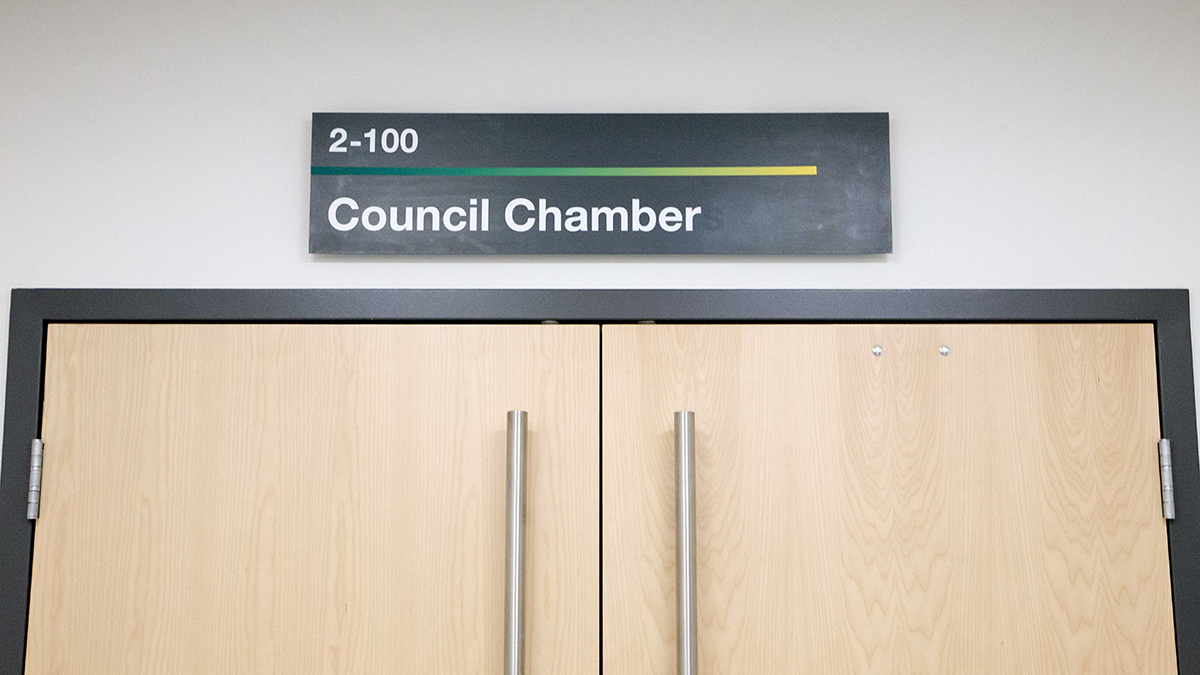Students’ Council reckons with warning from DIE Board following ASC referendum
 Joshua Storie
Joshua StorieLast month, Students’ Council was warned in a ruling handed down from the Students’ Union’s judiciary that breaking more bylaws would result in action against council.
The March 22 ruling from the Discipline, Interpretation, and Enforcement (DIE) Board, following a hearing on March 13, confirmed that the procedure for approving Aboriginal Student Council’s (ASC) referendum was broken. However, the board didn’t impose any punishment. The complaint was initiated by arts councillor Dierdra Cutarm on March 7, alleging that Students’ Council broke bylaw when approving the Aboriginal Students’ Council (ASC) referendum and the Student Legal Services plebiscite.
The complaint alleged the referendum failed to follow bylaw 6100, section 35, which says that the Students’ Union’s bylaw committee needs to approve, within 30 days of getting the proposal, a question that outlines elements such as the committee overseeing administration of the fee, how to appoint at least one Students’ Council member to the committee of the fee, how the fee is administered to part-time, Augustana, and off-campus students, and if and how students can opt-out.
When she filed the complaint, Cutarm said she was hoping that it would help first-time councillors in Students’ Council.
“The only thing I was hoping for, I just didn’t want first-year councillors being taken advantage of just for the sake of progress,” she said.
After the ruling was made, Cutarm said she felt “vindicated” by the decision. She added that one of the issues with Students’ Council currently is the lack of training before council starts. While she appreciates the work Discover Governance does training and supporting SU student representatives, she said she wishes older councillors took on more of a mentorship role.
“As I was sitting in there [in the hearing], it was a lot of intimidation and a lot of ‘You shouldn’t have done this, you don’t know what you’re talking about,’” she said. “So it was nice to know that my concerns were valid.”
However, Nathan Sunday and Katherine Belcourt, two campaigners for the “Yes” side of the ASC referendum, said the process for creating the referendum question was “well-explained,” and that Cutarm should’ve raised her concerns in council if she had any.
“If councillor Cutarm had those concerns, she should’ve voted no on the motion. But she did not. Or have asked questions, which she did not at the meeting,” Sunday said.
Emma Ripka, vice-president (operations and finance), served as a proxy for Michelle Kim, chair of the bylaw committee, during the hearing on March 13, where she asked Cutarm what her reasons were for filing the complaint.
Ripka was reprimanded by the DIE Board in their ruling, who said the comments were “particularly inappropriate” because of the insinuation the complaint shouldn’t have been filed.
In a Students’ Council meeting on March 26, Ripka clarified that she asked the questions on her own behalf and that she did so “out of curiosity.”
“I think that the DIE Board ruling kind of painted it as a malicious intent, but that wasn’t exactly what it was,” she said. “It’s just that to put in all this work [to file the complaint], you want to see some sort of benefit. So I was asking [Cutarm] what was the underlying purpose to bring up this concern because it shows that something isn’t working internally in the Students’ Union.”
Ripka added that she had taken Cutarm’s concerns about training into consideration when she prepared the SU’s budget presentation to council.
Third time Students’ Council has broken bylaw this year
This is the third time this year that Students’ Council has broken bylaw, said DIE Board’s chief tribune Karamveer Lalh.
“It might indicate that council simply needs a way to better learn their bylaws or change the bylaws for clarity,” he said.
Michelle Kim, chair of the bylaw committee, which oversees the formulation of referendum questions, said the committee will be making recommendations to next year’s committee on changes such as more training opportunities and person-to-person transition.
“As a bylaw chair, I think what’s important is that we make changes based on [the DIE Board’s] recommendations,” she said. “It provided… the guidance for us to move on to re-wording and which [bylaws] to maybe remove, [and] the sections to add on to.”
Kim agreed with Cutarm’s statements about training, adding that she thinks councillors, and especially committee chairs, need more training.
Students’ Union president Reed Larsen said he would “love” to see more collaboration between the different structures of the SU, such as Students’ Council, Discover Governance, and DIE Board.
“I would absolutely love to see more harmony between all of the SU, Students’ Council, Discover Governance, and DIE Board,” he said. “We have heard loud and clear this year that councillors want more training.”
Larsen said he recognizes that bylaws can take a long time to understand, and moving forward, said council has learned a lot from the DIE Board process.
“I think council has to really think about how it… needs to work through this process in the future,” he said.
Moving forward, Lalh said DIE Board hopes council has taken the ruling as a “learning experience,” and that it’s important for council in the future to limit the number of times bylaws are broken.
Cutarm said she hopes council will take the decision to heart, and understand that it’s fine for council to take their time making decisions.
“I hope they [take it to heart], because at the time, it just came down to egos,” she added. “I just want all of us, because I’m also complicit in this… to just know what we’re here to do, what our main roles in council are because it seems to me that’s where a lot of the confusion comes from.”




